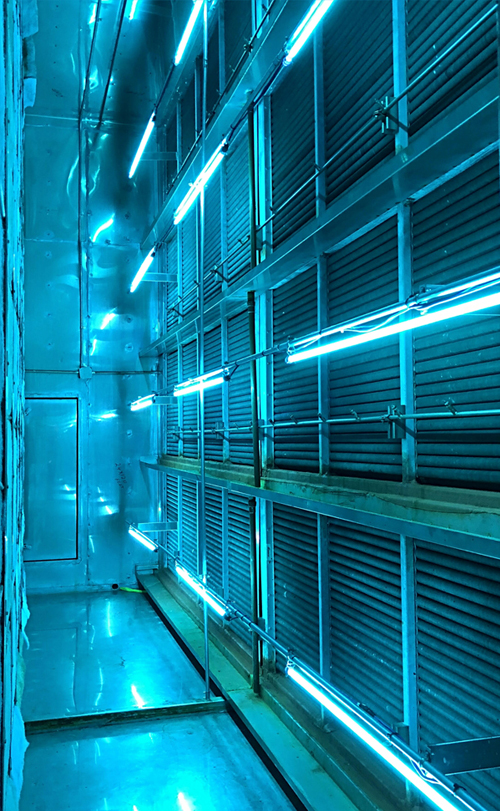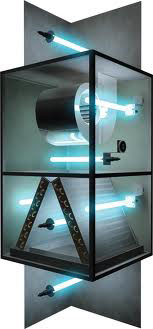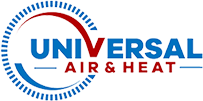Germicidal UV Lamps for Air Conditioners
Air conditioning UV Lighting is designed to keep air conditioner evaporator coils free of mold, bacteria and the development of a microbial breeding ground.
AC Unit UV Lighting is perfect for individuals who suffer from allergies
- Silent operation
- Kills bacteria & mold growing on the air conditioner evaporator indoor coil
- Enhanced indoor air quality in your home or office
- Enhanced air flow
- Minimizes microbial build-up on air conditioner evaporator coil
- Improves air conditioning system efficiency and prolongs the life of the entire HVAC system
- 1 year limited warranty, 90-day limited warranty for lamps
Lightstick is a new breed of germicidal UV light for air conditioners.
All new 24V power supply mounts inside air handler control panel and connects remotely to a water-resistant UV
lamp for a fast, simple installation. Multiple germicidal UV Light installation options. Install remote UV lamp via
lamp bracket or directly into an A-coil delta plate.
Ozone Generation:
- Optional
Average Bulb Life:
- 9000 Hours Continuous
Weight:
- Less than 2 lbs.
Power:
- 24V, 50/60 Hz.
Features
- 24 volt power supply
- 14″ and 16″ lamp lengths
- Connects to 24V power at control panel
- Expanded range ballast(19V-34V)
- 3000V surge protection
- 6ft lamp cord
- Water-resistant lamp connector
- Magnetic lamp bracket
- Self-display packaging
- 5-yr power supply warranty
Dimensions:
- Lamp Bracket: 3.5″ x 1.75″ x 2.25″
- Power Supply: 4.25″ x 2.25″ x 2″
Dirty air conditioning coil without UV protection after just 2 years
Clean air conditioning coil with UV protection after just 2 years
The U.S. Environmental Protection Agency (EPA) has cited indoor air pollution as one of the top five growing concerns in our
countryuv-light-tube – Copy today. As we spend most of our daily lives indoors the quality of the air we breathe indoors is
critical.Normal condensation that takes place during the cooling process is the # 1 potential for growth of mold and bacteria on
your air conditioning coils. U/V Lamps are designed to kill mold and bacteria by breaking down its DNA. This technology has been
trusted for over 60 years to kill microorganisms in water purification, the food processing industries, hospital operating
rooms and more. By installing a UV Lamp in your homes air conditioning ( HVAC ) system you can reduce your family’s risk of
allergic reactions and illnesses as well as eliminate the foul odors associated with such growth on the evaporator coil.
Some of the benefits
- Health: 50% of illnesses (such as colds, flu, allergies and asthma) are caused or aggravated by mold,
mildew, bacteria and fungi, according to the American College of Allergists. - Air Conditioning (HVAC) Equipment Protection: Mold and mildew can accumulate on your air conditioner’s
heating and cooling system causing the system to work harder creating higher electric bills due to the coils being restricted.
This can lead to costly air conditioner repairs that could have possibly have been
prevented as well as the need to replace your air conditioning system many years before you should have to. - Energy Savings: A properly installed UV Lamp saves you money on your utility bills by allowing your air conditioning
( HVAC) system to run less often, for shorter periods of time and at peak efficiency. If your air conditioning system is clean
it will circulate air and produce the strongest air flow that your system has to offer. A properly installed germicidal UV Lamp will
help keep your air conditioning system cleaner for improved indoor air quality. - Peace of mind that the air your family is breathing will travel thru U/V protection
Clips from ACHR NEWS story posted on 3/9/2020
As guardians of the indoor air we breathe, HVAC contractors and technicians stand alongside public health workers in the fight against coronavirus (COVID-19). As with the SARS outbreak in 2003, the airborne nature of the new coronavirus (part of the same family of viruses as SARS) puts the epidemic — and its prevention and containment — front and center for HVAC professionals.
“You can’t guarantee that because you’ve installed a certain product, you’ve prevented infections from occurring, because there are multiple ways that they can be transmitted,” said William Bahnfleth, ASHRAE presidential member.
ALL ABOUT AIRBORNE TRANSMISSION
One of the big questions about coronavirus — especially from an HVAC perspective — is how significant of a role airborne transmission plays in its spread.
“If I were to cough or sneeze in your direction unprotected, some of the virus-containing droplets coming out of my mouth or nose might enter your mouth, eyes, or nose and cause an infection,”.Another mode of transmission involves intermediate surfaces. For example, an infected person might cough or sneeze into their hand and then leave infective material on a door knob that someone else might touch and then transfer it to their own mouth or eye.”
“But there’s also the potential for airborne transmission,” Bahnfleth said. “And if viruses that are viable are in those droplets that you’re producing, some of them will be small enough that they will stay airborne for a long time. So, it’s not impossible that infectious particles in the air could stay aloft long enough to be collected, say at the return grille of an HVAC system, go through a duct, and infect someone in a different space.”
“Because there are three distinct ways of transmitting an infection,” he added, “even perfect control of airborne pathogens would not eliminate all risk.”

A PRIMER ON PREVENTION
The recently reaffirmed ASHRAE position document on airborne infectious diseases, identifies three demonstrated methods of controlling airborne infection that have proof of efficacy: ventilation, particle filtration, and UV.
Filters
According to Bahnfleth, any air cleaner that removes particles from the air has some potential to reduce exposure to coronavirus. The question lies in what efficiency of filter is required to be effective enough to have a significant impact on how likely people are to get infected by the airborne route.
“Filters are an exceptional means to trap particulates and sub micron contaminants including PM2.5 (particles that have a diameter of less than 2.5 microns),”.”The smaller the contaminant’s diameter, the denser the filter media must be to capture.”
HEPA (high-efficiency particulate arrestance) filters, commonly used in critical care environments within healthcare facilities, are 99.97 percent effective at trapping particles down to 0.3 microns in size, he said.However, like many viruses, coronavirus is very small, measuring between 0.06 and 0.14 microns in size.


Air Handler Disinfection: Installed inside the AHU, the TRS system disinfects air handler and equipment.
UV
UV disinfection systems for HVAC complement conventional filtration, Engel said, by addressing microorganisms that are small enough to pass through filters.
“Contractors are now learning that filters are designed to capture larger particulates in the air … [while] surface ultraviolet disinfection and airstream UV disinfection are effective at inactivating pathogens,” he said. “UV germicidal systems have also been shown to reduce microbial load and pathogens that are found within the HVAC system and drain pan that would otherwise be introduced and distributed throughout the envelope of the building.”
Since coronaviruses are transmitted via air and direct contact, it could be presumed that HVAC systems can inadvertently spread the infection, said Daniel Jones, president, UV Resources.
“Airborne droplets containing infectious agents can remain in room air for six minutes and longer,” he said. “Scientists have found that COVID-19 can remain infectious on surfaces at room temperature for up to nine days. Upper-air UV-C fixtures can destroy those microbes when they are exposed to the UV-C energy in a matter of seconds.” Kill ratios up to 99.9 percent on a first-pass basis have been modeled, and concentrations are further reduced each time the air circulates.
Surface-cleaning UV-C systems, Jones continued, provide 24/7 irradiation of HVACR components to destroy bacteria, viruses, and mold that settle and proliferate on coils, air filters, ducts, and drain pans, preventing the growth of pathogens that can eventually become airborne and get circulated by HVAC systems. A system installed for HVAC surface irradiation, while not specifically designed for it, can also provide first-pass kill ratios of airborne pathogens of up to 30 percent.
According to ASHRAE, the germicidal wavelength can kill 90 percent of all microorganisms living on HVAC air ducts and evaporator coils, depending on wavelength intensity and length of exposure.
“Although the germicidal wavelength was effective in killing other varieties of coronaviruses, such as SARS and MERS, scientists do not yet know about the impact of UV-C on COVID-19,” Jones noted.
“However,” added Engel, “we have no reason to believe it will be much different than other similar type viruses.”
CUSTOMER CALLS AND CONCERNS
Solutions like UV and filters can help contractors address coronavirus concerns that their clients may bring up as news and new cases of coronavirus continue to surface.
Commercial contractors, Jones advised, can suggest that facility managers consider employing both upper-air UV and HVAC germicidal fixtures to mitigate the potential spread of airborne diseases in communal areas. Immunocompromised individuals in emergency waiting rooms, urgent care centers, doctor’s offices, or senior living centers create an environment where potentially undiagnosed or untreated patients are in close proximity to others.
“People can spread the virus before anyone knows they are contagious — and, more importantly, before anyone can take precautions,” he said. “Therefore, it’s incumbent on facility managers to use preventative infection control measures.”
Using a dedicated outdoor air system also cuts down on contaminated air, Bahnfleth added, because these systems don’t recirculate the air from one space to others.
If homeowners bring up the topic, Bahnfleth suggested recommending better filters, humidity control, room air cleaners, and home UV products, the latter of which can be installed on a residential furnace or air conditioner.
“It’s basically the same solutions as we would use in other types of buildings, but packaged for the residential market,” he said.
He also suggested to continue running the fan when the cooling is off in order to remove particles.
“The big problem with the filters in home air conditioning equipment is that the systems are not doing anything when they’re off, so you have to intentionally make it run to circulate air if you want it to be a whole house air cleaner,”
“From my experience, the important thing to keep in mind is that infection control usually doesn’t have a silver bullet,” he said. “Risk reduction involves doing a number of different things, and engineering controls — like putting in better filters or putting UV into your building — is not the only thing you should do. Things like hygiene, being careful about whether you touch your face, whether you’re shaking hands with people, whether you’re washing your hands frequently … those, in many ways, are just as important.”
Universal Air & Heat
Universal Restoration
Office phone: 813-510-5667
State License # CAC058142, HVAC
State License # MRSR3334, Mold Remediation
State License # MRSA3162, Mold Assessor
IIRC Certified # 6411809, WRT Water Restoration Technician
NADCA Certified # A3795 (National Air Duct Cleaners Association) certified ventilation systems mold remediator
Universal Air & Heat (Corporate)
5460 Reese Rd # 12
Davie Fl, 33314
Universal Air & Heat (Tampa)
501 Hobbs St
Tampa,FL 33619
We are South Florida and Tampa Florida’s indoor air quality leaders and carry all types of germicidal UV Lights for air conditioners.
Call us today
Save 15% When You Schedule You Appointment Online










